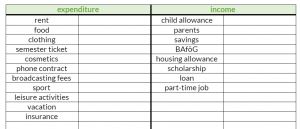
The current corona crisis affects us all. Our day-to-day life is restricted on many different levels. Most stores, restaurants, bars and other establishments had to be closed down to prevent the spread of the virus. We just start to realize the impact this will have on the different parts of society. Some are hit harder than others.
As the team of CHANCEN eG we are lucky for we are able to work remotely without any problems. The financing of the tuition fees offered by CHANCEN through the ISA will not be influenced by the current situation. We still support our students with the ISA and we’re also still able to finance the tuition fees of new applicants. We are aware that many (of our) students currently can’t work in their part-time job, for example in gastronomy, and therefore might encounter financial difficulties.
It’s always been and is still the goal of CHANCEN eG for everyone to get the best education possible (independent from their financial or personal situation), that’s why we put together some financing tips in this special time.
Besides, since many universities have delayed the start of their summer semester, we have collected some tips on how to use your additional free time.
1. Analyse your situation
First of all, it’s important to know your income and expenditures. Income through the part-time job may be missing for a while, but maybe you can save some expenses because you spend less money on leisure activities, tickets or holidays.
Below you’ll find a table which might help you to get an overview.

2. Compare financing options
You are probably already familiar with the usual sources of financing for living expenses, such as scholarships, loans and BAföG, as you have already dealt with these before you started studying. If your expenses are currently higher than your income, it might still be worthwhile to consider your options again. You can find a good overview in our financing guide. Especially a KfW-loan or a Bildungskredit from the Federal Government can help to bridge financial bottlenecks. The state-run KfW Bank offers a low-interest student loan with an interest rate of 3.95%, independent of parents and income.
The rate of interest has been subject to short-term changes since 1 April due to the corona crisis.
Some good news is that BAföG will continue to be paid even if the universities are closed and lectures are cancelled. The Federal Minister of Education says that it is important to her that BAföG recipients do not suffer any disadvantages due to the Corona Pandemic. First-year students should also receive BAföG, regardless of whether their university is postponing courses or not. Students who exceed their standard period of study due to corona should “in the vast majority of cases” retain their BAföG entitlement.
For a short period of time myStipendium offers a so-called everyday hero-scholarship, to the amount of 500 Euro per month for 12 months. It supports dedicated students who show engagement in the Corona crisis and help their fellow human beings. The application deadline is the 15th of May.
3. Find a new job
Another possibility to finance living expenses is to change the part-time job spontaneously. On the one hand, many jobs are currently cut, but on the other hand, some industries need additional support.
Agriculture, for example, is depending on seasonal workers; many of which immigrate from Eastern Europe. However, due to border closures caused by the pandemic, they are no longer allowed to enter the country, which means that there is a shortage of around 300,000 workers in the harvest assistance sector. The German Federal Ministry of Agriculture has therefore set up a portal that is designed to help find such jobs.
There are also system-relevant jobs which, as the name suggests, continue to be important and where help is increasingly needed due to the crisis. On Jobmensa.de you can find many temporary jobs offered in the retail sector. At #heldinnengesucht you can also find job offers in the neighbourhood help and care sector.
In addition, the health system is currently extremely strained. Nurses and doctors are reaching their limits in many places and the concern about a lack of nurses is great. For this reason, the Einstein Foundation has made € 300,000 available to the Berlin Charité through “Einstein Student Support for Corona Medical Emergency”. The money is intended to compensate medical students who are temporarily assigned to basic medical care. As a medical student, you can find out about those job offers at your university.
Anyone with a medical background or call centre experience can also support the Corona Hotlines.
If you take up a new job, it is still worth considering certain income limits. For example, the annual tax-free allowance for students is € 9,408 per year (equivalent to € 784 per month). When you exceed this amount you have to pay tax on the income above the limit and therefore you may have little benefit from your additional work. Already if you earn more than € 450 a month, your employer will automatically deduct income tax. Though these taxes you can get back at the end of the year through your income tax return.
If you are under 25 years of age and still have family insurance through your parents or spouse, your monthly income must not exceed € 450. Otherwise, health insurance contributions of more than € 100 per month will be due.
4. Use free offers
If you currently have to take a semester off, but still want to continue your education, there are numerous, mostly free courses and services to choose from.
Classcentral lists about 600 online courses from over 190 universities on a wide range of topics in different languages.
If you are especially interested in coding courses, have a look at Codecademy. Due to the current situation the education platform offers more than 10.000 free scholarships for high school graduates and students. They grant you the same access as paying students and therefore access to materials, projects and much more.
For particularly efficient learning, Getabstract offers free access to summaries of thousands of textbooks. From classics and business books to world literature, everything is included. Access will expire automatically on 18 May.
To compensate at least somewhat for the loss of personal communication, many companies offer free limited subscriptions that allow video conferences with many people. These include, for example, LifeSize, Pronto, TeamViewer or Discord. They offer various advantages, so you can choose the tool that suits you best. The Süddeutsche Zeitung has written a nice article about this and other useful apps and programs.
A large collection of (live-)streams, ranging from music to yoga sessions and home workouts, can be found on dringeblieben.de. Here you can always find exciting options as past streams are also saved. Also free brain-training apps à la Quizduell, Peak, Left vs. Right: Gehirntraining can keep your brain busy in a fun way.
5. Support each other
We hope that our overview has offered you a good orientation and shown you possibilities and solutions.
Most of us are doing relatively well and we can consider ourselves lucky to have a roof over our heads and to be healthy for the most part. In these times, let’s put special emphasis on friendly cooperation and support each other.
Members of CHANCEN eG are welcome to seek advice in case of financial worries. Simply book a financial advice session with us. Our community in Rwanda is more affected by the Corona crisis than we are in Germany. If you have the opportunity, you are welcome to support our subsidiary CHANCEN International gGmbH with donations, to ensure that the studies of our approximately 1,300 students in Rwanda can continue.

